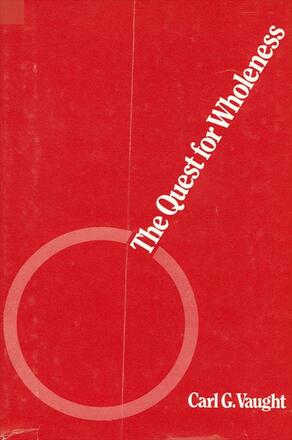
The Quest for Wholeness
Alternative formats available from:
Description
"This book has been written for the artist, for the theologian, and for the philosopher, each of whom must be concerned with the question, "What does it mean to be human?" But at a deeper level, it is written for any reader who knows what it means to be fragmented, and who is willing to undertake a quest for wholeness in experiential and reflective terms." — from the Preface
The Quest for Wholeness is a philosophic odyssey into humankind's feelings of fragmentation, and the search for unity born of those feelings. It blends the concreteness of art and religion with the discipline of philosophy to illuminate those places in experience and reflection where fragmentation is encountered and the meaning of wholeness is first discovered.
Carl Vaught discusses the problems of fragmentation and unity, beginning with the aesthetic concreteness represented by the quest in Herman Melville's Moby Dick; moving through the religious dimension represented by the biblical stories of Abraham, Isaac, Jacob, Joseph, and Moses; passing on to the reflective discourse in Plato's Euthyphro; and ending in a confrontation with Hegel that unites the concrete particularity of religious and communal life with the dialectic of Socrates' normative reasoning.
This book is written with the conviction that the professional philosopher should not address a merely professional audience, but the larger world as well, and that in the end he must come to terms with himself and with the most pressing questions that confront the human spirit.
Carl G. Vaught chairs the Department of Philosophy at The Pennsylvania State University. The holder of both a master's degree and doctorate in Philosophy from Yale University, he has published several articles dealing with the philosophy of religion and philosophy in literature. Vaught also has lectured extensively on philosophy, religion, and the quest for wholeness.
Reviews
"What impresses me most about this book is the way in which it accomplishes the author's intent: to address real human issues and problems from a philosophical standpoint which is not located on an abstract, Olympian summit accessible only to professional philosophers. I am intrigued by Vaught's methodology and by his brilliant success in using it. He uses classic instances of human experience—as expressed in their most concrete forms (i.e., art, myth, dialogue)—and exposes the structures of that concreteness, thereby allowing the various movements toward wholeness to shine forth. I found his treatment of Moby Dick and of the biblical accounts particularly compelling and unusually insightful." — Elizabeth M. Kraus, Professor of Philosophy, Fordham University